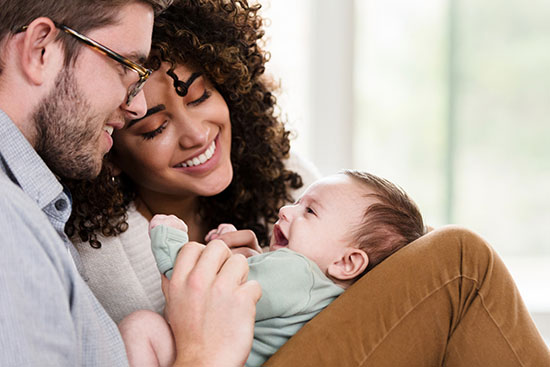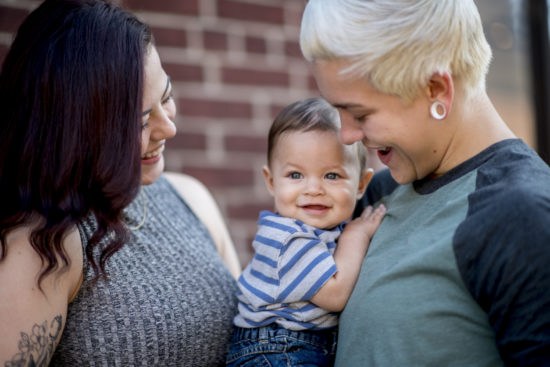Relationships with partners, family and friends often change after having a baby. Read about ways to deal with relationship stress and tackle issues.

The change from a couple to a family of three, or possibly more, can be one of the biggest transformations you face when you become a parent. Or you might be deciding to navigate parenthood alone from the start, but are wondering how relationships with friends and family will shift.
While there are challenges in bringing up a baby – during the first year in particular – some couples grow stronger as they find a new respect for each other as parents and share experiences that bind them together. It can help to deal with any relationship problems you face after having a baby as they happen.
One of the biggest factors leading to tension and issues in relationships after childbirth is tiredness. Lack of sleep can have a huge impact on day-to-day life and it’s useful to consider options for managing this. For example, when sleep deprivation kicks in, one parent may need to take some time sleeping in another room to catch up.
Discover our top tips for taking care of yourself when you have a baby.

New parents are often short of time too. The hours previously used for socialising, relaxing and domestic tasks can be sharply reduced, and this can change the dynamics of a relationship.
Money — or lack of it — can also be a cause of stress for couples. For many new parents, adjusting to life on a reduced income or one salary can be especially challenging. Often, there are emotional issues underpinning money rows, such as the loss of financial independence or feeling the pressure of having to provide for the family.
Explore our handy tips on talking to your partner about money here.
One or both partners may also be adjusting to life caring for a baby 24/7. It can help to recognise the underlying issues fuelling the tension and try to address that.
With a first baby, the arrival can mean that two people who were the most important ones in each other’s lives now have a third (or more with twins or multiples) very important person to think about.

Some parents find this transition difficult, struggling with the fact they are no longer at the forefront of their partner’s mind.
Partners can feel sidelined as mum concentrates on their child. Equally, some women may feel like they disappear as everyone focuses on the new baby. They may feel their role simply diminishes to caring for and feeding the baby.
It’s important to acknowledge how roles might change and how this can make both parents feel. It’s also helpful to talk through each other’s day together to find out what’s been positive or challenging and gain an understanding of the other’s day.
You can read more in our articles about mums’ perspectives and dads’ perspectives on their relationships after having a baby.
Some parents find that they have different views on parenting which can cause conflict. It can be easy for one parent to become the ‘expert’ and undermine the other’s confidence.
It helps to discuss each other’s views and try to develop a joint approach. Accepting that you may have different ways of looking after your baby is also important. Just because you do things differently doesn’t mean that one way is right or wrong. Find out more about parenting as a team.
The physical side of a relationship can change dramatically
The physical side of a relationship can also change dramatically — thanks to exhaustion, dealing with the physical and emotional impact of the birth, and the demands of life with a newborn. It can take time to feel like having sex again after birth.
A positive approach could involve patience, a sense of humour, understanding, and a willingness to find new ways of expressing physical affection until you both feel ready to have sex again. Read more about supporting your sexual relationship.
Open and honest communication is vital in any relationship — and especially for new parents.
If there is tension:
You can find more tips on effective relationship communication in our article here.
Mums, dads and other co-parents can all experience mental health problems, such as depression or anxiety, which can have a big impact on relationships. If you think that you or your partner is suffering from a mental health problem, supporting each other and finding help is really important.
To find out more about emotional problems and how to get support, you might find one of our articles about how you might be feeling helpful.
The birth of a baby may bring some relationships with friends and family closer than you expect, and others may become more distant or challenging.
It’s up to you to decide whether to take onboard the advice given
Many parents find friends and family will offer advice and opinions — sometimes unasked for and sometimes in conflict with your own parenting ideas. If you disagree with the advice being offered, it can help to focus on the fact that it is usually well meaning and that it’s up to you to decide whether to take onboard the advice given.
For many parents the support that may be offered by grandparents, other relations, friends and even neighbours can be invaluable. Social support can be hugely beneficial to a parent’s emotional well-being in the postnatal period so don’t be afraid to ask for or accept help.
You can read more here about the changes you might experience in your relationships with family and in-laws after having a baby.
Looking after yourselves as a couple and as individuals is important. It may be simplistic but if you are happy you are more likely to be happy in your role as a parent too.
It will be a learning curve in the first few weeks and months, but with the right support, you can work it out together.
Sometimes, despite your best efforts, relationships break down. If you’re a single parent, or considering breaking up with your partner, you might feel daunted by bringing up your child alone.
Solo parenting isn’t uncommon and there are lots of other parents out there going through the same thing – in fact, one in four children live with one parent. Gingerbread is a fantastic source of of support and information if you’re a single parent, or thinking about separating. Take a look at their website. You might also like to read our article on navigating life as a single parent.
Our support line offers practical and emotional support with feeding your baby and general enquiries for parents, members and volunteers: 0300 330 0700.
You might find attending one of NCT’s Early Days groups helpful as they give you the opportunity to explore different approaches to important parenting issues with a qualified group leader and other new parents in your area.
Make friends with other parents-to-be and new parents in your local area for support and friendship by seeing what online NCT activities are happening nearby.
Relate, a charity which specialises in supporting relationships, has information on coping with a new baby.